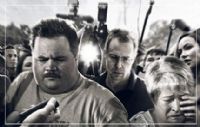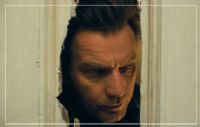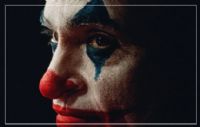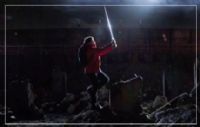Sunset Song At Foyle Film Festival
Date: 23/11/2015
Movie Review
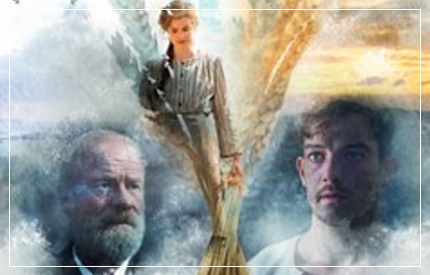
Adapted by director Terence Davies from Scottish writer Lewis Grassic Gibbon's highly regarded novel, Sunset Song follows in the footsteps of last year's Foyle Film Festival opener, Testament Of Youth, in revolving around the on screen wartime perspective of an educated Briton in the early 1900s.
But where that Briton's (or Brittain's, as they were Vera Brittain's) adapted memoirs felt constrained by both stateliness and conventionality, this feature foregoes all narrative boundaries in favour of something much more open, where the acting, cinematography and music are paramount. There are few obvious filmic, even theatrical, precedents in Sunset Song, and this expressive, eloquent and ultimately excellent film hugely prospers for that.
Sunset Song is the sort of film that can be easily placed into context with recent current affairs, as a reflection of how sudden outbreaks of violence and terror can disrupt, even destroy, people's lives. What is perhaps most impressive about the source material, though, is that one can't easily categorise it as a World War I work, per se; the trademarks and trademark visuals of the war itself are very sparsely seen in the two-hour-plus running time of the film.
The decision to focus the near-entirety of the novel in and around the fictional estate of Kinraddie, set in rural Aberdeenshire, was an inspired one, as it helps Davies to capture a distinct cinematic mood in accordance with the times. A remote area that can be as unique in its idyllic beauty as in its distant pain, this part of Scotland is central to the kind of isolation in which one can feel homely and happy, or lost and lonely.
This is exactly what Chris Guthrie, marvellously portrayed by model-turned-actress Agyness Deyn, feels as she finds her way through early womanhood. As she grows up, she is a learned bookworm and a determined farmhand who finds solace in both a literary and physical shell, be it in a book, at a plough, or hidden away in blowing crops. Much of the story, such as it is, is told through narrated fragments indicative of Chris's intelligence and state of mind; when listening to these, and taking in everything that goes on around her, we, the audience, are fully immersed in Chris's internal and external growth over the course of the picture, brought upon by changes in everything and everyone bar Kinraddie and its vicinity.
Terror is too common for its own good in the Guthrie household before and during the war. In the case of Chris's father (Peter Mullan), his attempts at assertion spill over into aggression all too frequently for Chris's brother and mother. It is an astonishingly prophetic warning of the fear that Chris will have to face later on with both her father and her husband-to-be, Ewan (a brilliant Kevin Guthrie); what is all the more frightening is that everything is filmed in such a way that we genuinely don't see it coming.
Particularly as Ewan is, when Chris first encounters him, genuinely the calm after the storm, the guardian and companion that Chris both desires and needs. History tells us that their honeymoon period and the joys of parenthood won't last, and they don't; even so, the manner in which conscription transforms Ewan during the war is truly startling. Credit both Davies and Kevin Guthrie here for skilfully handling a transition in character that could so easily have been jarring.
It's arguably one transition too many for Chris, but definitely not for Deyn. Surely among the best actresses working today, she simply astonishes in her conveyance of the joy and pain felt on Chris's journey from dependent, to interdependent, to independent. A journey that leaves Chris much the wiser, the lines on her face and the kind-hearted smile wearily and wistfully reflecting the titular sunset song that echoes on the soundtrack and, almost certainly, in her mind.
Simon Fallaha
Sunset Song was shown on the opening night of the Foyle Film Festival. For more information visit foylefilmfestival.org.
But where that Briton's (or Brittain's, as they were Vera Brittain's) adapted memoirs felt constrained by both stateliness and conventionality, this feature foregoes all narrative boundaries in favour of something much more open, where the acting, cinematography and music are paramount. There are few obvious filmic, even theatrical, precedents in Sunset Song, and this expressive, eloquent and ultimately excellent film hugely prospers for that.
Sunset Song is the sort of film that can be easily placed into context with recent current affairs, as a reflection of how sudden outbreaks of violence and terror can disrupt, even destroy, people's lives. What is perhaps most impressive about the source material, though, is that one can't easily categorise it as a World War I work, per se; the trademarks and trademark visuals of the war itself are very sparsely seen in the two-hour-plus running time of the film.
The decision to focus the near-entirety of the novel in and around the fictional estate of Kinraddie, set in rural Aberdeenshire, was an inspired one, as it helps Davies to capture a distinct cinematic mood in accordance with the times. A remote area that can be as unique in its idyllic beauty as in its distant pain, this part of Scotland is central to the kind of isolation in which one can feel homely and happy, or lost and lonely.
This is exactly what Chris Guthrie, marvellously portrayed by model-turned-actress Agyness Deyn, feels as she finds her way through early womanhood. As she grows up, she is a learned bookworm and a determined farmhand who finds solace in both a literary and physical shell, be it in a book, at a plough, or hidden away in blowing crops. Much of the story, such as it is, is told through narrated fragments indicative of Chris's intelligence and state of mind; when listening to these, and taking in everything that goes on around her, we, the audience, are fully immersed in Chris's internal and external growth over the course of the picture, brought upon by changes in everything and everyone bar Kinraddie and its vicinity.
Terror is too common for its own good in the Guthrie household before and during the war. In the case of Chris's father (Peter Mullan), his attempts at assertion spill over into aggression all too frequently for Chris's brother and mother. It is an astonishingly prophetic warning of the fear that Chris will have to face later on with both her father and her husband-to-be, Ewan (a brilliant Kevin Guthrie); what is all the more frightening is that everything is filmed in such a way that we genuinely don't see it coming.
Particularly as Ewan is, when Chris first encounters him, genuinely the calm after the storm, the guardian and companion that Chris both desires and needs. History tells us that their honeymoon period and the joys of parenthood won't last, and they don't; even so, the manner in which conscription transforms Ewan during the war is truly startling. Credit both Davies and Kevin Guthrie here for skilfully handling a transition in character that could so easily have been jarring.
It's arguably one transition too many for Chris, but definitely not for Deyn. Surely among the best actresses working today, she simply astonishes in her conveyance of the joy and pain felt on Chris's journey from dependent, to interdependent, to independent. A journey that leaves Chris much the wiser, the lines on her face and the kind-hearted smile wearily and wistfully reflecting the titular sunset song that echoes on the soundtrack and, almost certainly, in her mind.
Simon Fallaha
Sunset Song was shown on the opening night of the Foyle Film Festival. For more information visit foylefilmfestival.org.


























